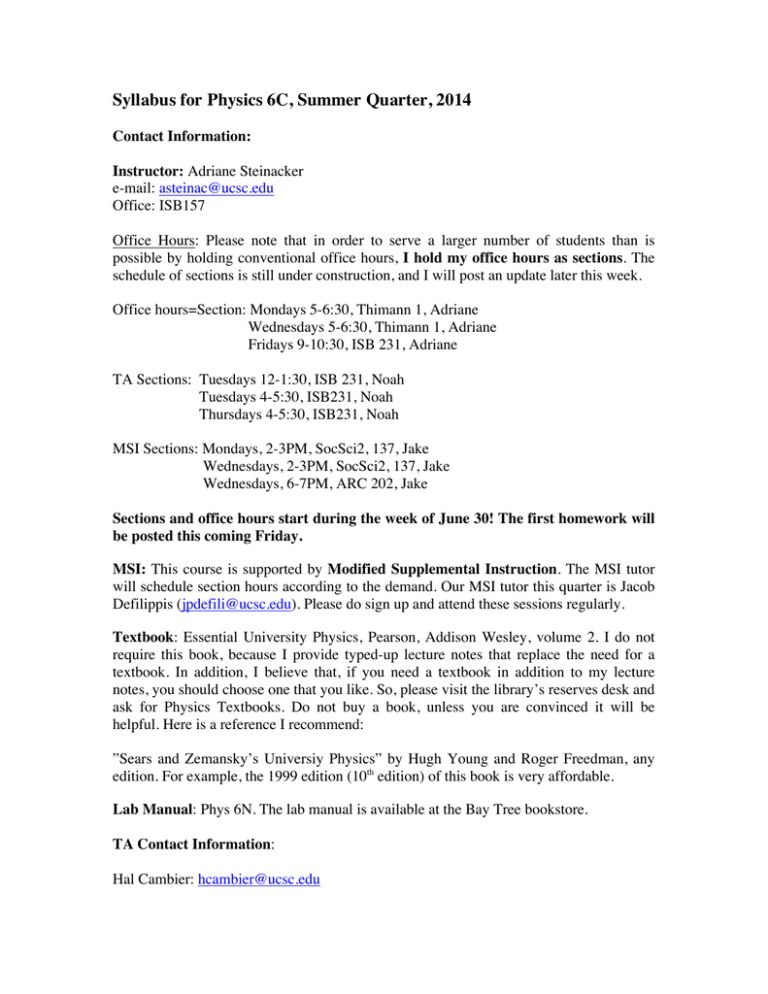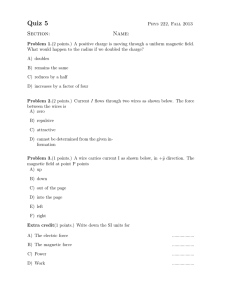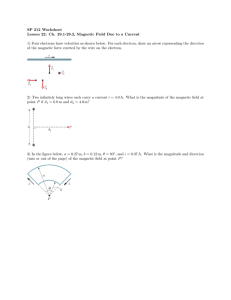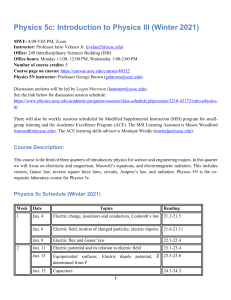
Syllabus for Physics 6C, Summer Quarter, 2014
Contact Information:
Instructor: Adriane Steinacker
e-mail: asteinac@ucsc.edu
Office: ISB157
Office Hours: Please note that in order to serve a larger number of students than is
possible by holding conventional office hours, I hold my office hours as sections. The
schedule of sections is still under construction, and I will post an update later this week.
Office hours=Section: Mondays 5-6:30, Thimann 1, Adriane
Wednesdays 5-6:30, Thimann 1, Adriane
Fridays 9-10:30, ISB 231, Adriane
TA Sections: Tuesdays 12-1:30, ISB 231, Noah
Tuesdays 4-5:30, ISB231, Noah
Thursdays 4-5:30, ISB231, Noah
MSI Sections: Mondays, 2-3PM, SocSci2, 137, Jake
Wednesdays, 2-3PM, SocSci2, 137, Jake
Wednesdays, 6-7PM, ARC 202, Jake
Sections and office hours start during the week of June 30! The first homework will
be posted this coming Friday.
MSI: This course is supported by Modified Supplemental Instruction. The MSI tutor
will schedule section hours according to the demand. Our MSI tutor this quarter is Jacob
Defilippis (jpdefili@ucsc.edu). Please do sign up and attend these sessions regularly.
Textbook: Essential University Physics, Pearson, Addison Wesley, volume 2. I do not
require this book, because I provide typed-up lecture notes that replace the need for a
textbook. In addition, I believe that, if you need a textbook in addition to my lecture
notes, you should choose one that you like. So, please visit the library’s reserves desk and
ask for Physics Textbooks. Do not buy a book, unless you are convinced it will be
helpful. Here is a reference I recommend:
”Sears and Zemansky’s Universiy Physics” by Hugh Young and Roger Freedman, any
edition. For example, the 1999 edition (10th edition) of this book is very affordable.
Lab Manual: Phys 6N. The lab manual is available at the Bay Tree bookstore.
TA Contact Information:
Hal Cambier: hcambier@ucsc.edu
Dean Henze: dhenze@ucsc.edu
Noah Kent: nakent@ucsc.edu
Stephen Martin: stelmart@ucsc.edu
Lab Sections:
Tuesdays, 9AM-12PM, 6N-01, Steve
Tuesdays, 1PM-4PM, 6N-02, Hal
Wednesdays, 9AM-12PM, 6N-03, Dean
Thursdays, 9AM-12PM, 6N-04, Dean
Course Work: Your grade will be made up from the following three contributions:
1) Homework, 20%. Homework sets are assigned weekly. Homework is usually due
within one week from the posting date unless otherwise announced. It is very important
to note that due to the immense workload of grading the homework by our TAs, I cannot
accept late homework. The problems are usually selected from the material taught during
the previous week of class. Taking the homework seriously is very important, because it
helps you review the material, and prepares you for the exams. You might find attending
the sections helpful. I will soon post a “Homework Guidelines” document, which
elaborates on the various rules and regulations as well as details about the grading
procedure.
2) Midterm Exam, 35%. This exam is scheduled for Friday, July 25, during class.
3) Final Exam, 45%. The final exam is on Friday, August 29, during our last class
period.
Labs: There will be a total of 8 labs. Labs must be attended regularly. A student who
missed two or more labs cannot pass the lab section of the class. If for a plausible excuse
you must miss one of the labs, make sure to inform your TA well in advance, and to
discuss with her/him whether or how a make-up might be possible. It is completely up to
the TA to approve or reject this possibility. Missing one lab will clearly affect the grade.
Please read the Introduction section of you lab manual and Appendix C (Guidelines for
Laboratory Notebooks) at the end of the Lab Manual carefully prior to attending your
first lab.
Labs start during the week of July 7!
Lecture Notes: will be available on our course website on eCommons. The syllabus, the
lab schedule, solutions to the homework problems, and other material will also be
available on this site. Be sure to familiarize yourselves with the site in order to not miss
important information!
Needed Equipment: Rulers and triangles, graphing paper, a calculator (not your cell
phone), a stapler.
Academic Integrity: While I encourage students to work together in groups, be it in
preparation for the weekly homework, or for the exams, each student must ensure a
thorough understanding of the material and of the problems solved. Following your group
study session or section, you should always write up your work individually. Being able
to rework your group’s effort will show you whether you really understood everything.
During exams, all work presented must be your own. Any cases of cheating will be dealt
with in accordance with the corresponding University regulations against academic
dishonesty. Please make sure to bring your student ID to the exams! Without
identification, your exam will be discarded.
List of topics:
Please note that I am not a “by-the-book” instructor, which is why you won’t find page
numbers and dates next to each topic. Since I post my lecture notes, and I provide
webcasts, you will know where in the following line-up of topics we are. I expect that as
skilled college students, you have developed the ability to find the appropriate reading in
the textbook of your choice. I also reserve the right to change the order of the topics if
needed (e.g. in order to keep pace with the labs), to skip a topic or add a new one.
1) Introduction and Motivation. Charges, conductors, insulators, the Electrostatic
Force.
2) The Electric Field, test charge, probing the Electric Dipole Field.
3) Charge distributions
4) The parallel plate capacitor
5) Motion of the electric dipole in a uniform electric field. Induced and permanent
dipole moment.
6) Electric Flux and Gauss’ Law
7) Electric field of charge distributions, revisited
8) Electric Potential, electrostatic potential energy, equipotential surfaces
9) Determining the electric field from the potential. The Van de Graaff Generator,
breakdown electric field and potential.
10) Capacitors, capacitance. Electrostatic energy stored in a capacitor.
11) Cylindrical and spherical capacitors. Capacitors in series and parallel. Dielectrics.
12) Electric current, resistance, Ohm’s Law, resistivity.
13) RC circuits. Charging and discharging a capacitor.
14) Direct Current Circuits (series and parallel). Power.
15) The electromotive force, emf, terminal voltage. Junction, resistance, and emf rule
for DC current circuits. The Ammeter and the voltmeter.
16) The Magnetic Field: discovery, sources, permeability constant, the Biot-SavartLaw.
17) The magnetic field generated by various current distributions. Ampère’s Law.
18) Motion of a point charge in a magnetic field. Lorentz Force.
19) The magnetic force between two parallel wires.
20) The e/m ratio, cyclotron motion, frequency, helical paths, magnetic mirrors.
Motion of charges in a uniform electric field. The discovery of the electron and
elementary charge.
21) Discovery of the electron
22) Crossed Fields, The Hall Effect, magnetic levitation.
23) Torque on a current loop. The magnetic dipole, magnetic moment. The electric
motor.
24) Magnetic flux, Faraday’s Law, induced current and induced emf. Lenz’s Law.
25) A simple generator. Induction and energy transfer. Inductance, Energy stored in a
magnetic field
26) LC and LR circuits
27) Alternate Current Circuits
28) Maxwell’s Equations. The speed of light.
The above list is not a list of individual lectures. Some of the topics are covered through
more than one class, others are just parts of one lecture.



